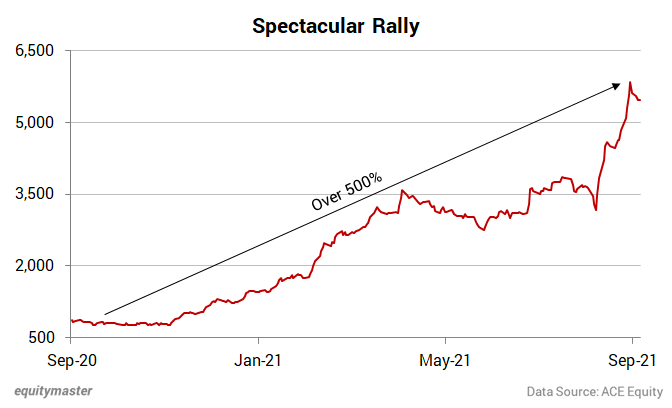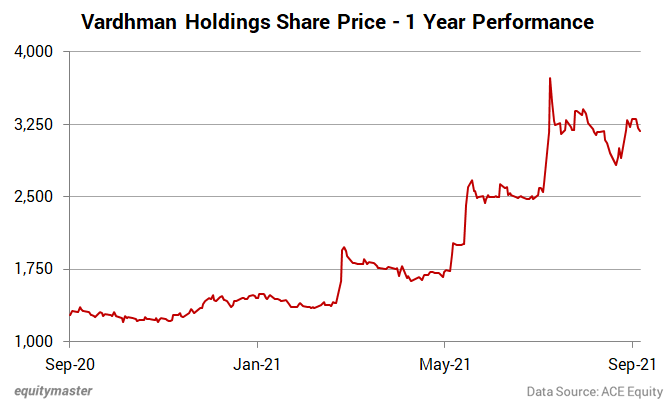- Home
- Views On News
- Sep 9, 2021 - 8 Stocks with Low Equity and High Promoter Holding
8 Stocks with Low Equity and High Promoter Holding

The free float is a measure of actual availability of stocks in the market for public investment.
It only takes into consideration those equity shares issued by the company that are readily available for trading in the market. DVR shares are not considered in the calculation of free-float market capitalisation.
There have been several cases in Indian share markets where a stock went on to multiply investors' wealthy by over 10x due to low free float.
In today's article, we look at eight stocks with marketcap over 5 bn which have low free float and high promoter holding.
#1 Disa India
Disa India is a leading equipment manufacturer with advanced foundry and surface preparation process technology.
It supplies complete foundry systems, with moulding machines, sand mixers with combination of sand plant equipment, surface preparation machines and environmental control systems across the country.
As of June 2021, the company has a total of 1.5 m shares outstanding. Out of this, 74.82% of shares are owned by the promoters!
The Indian foundry industry is the second largest in the world and Disa India has a 70% market share in the segment.
The company has only a tiny equity base of 1.5 m shares. It's also totally debt free.
To know more, check out Disa India's latest shareholding pattern.
#2 Hindusthan Urban Infra
Hindusthan Urban Infrastructure, incorporated in 1959, is an enterprise of The Hindusthan Group. It manufactures overhead conductors and electro-porcelain high tension insulators. It has a pan-India presence.
Power Grid Corp is its major client accounting for around 58% of the conductor business. It also sells conductors to T&D companies like Purvanchal Vidyut Vitran Nigam (PUVVNL) and to EPC companies like L&T.
As of June 2021, the company had a total of 1.4 m shares out of which 74.9% is held by its promoters.
That only leaves 0.36 m shares for public.
Despite the company reporting negative return on equity (ROE) for the past three consecutive years, its share price has skyrocketed.
In the past year alone, Hindusthan Urban Infra shares have surged over 500%.

#3 Tide Water Oil
Tide Water Oil Company is mainly engaged in the business of manufacturing and marketing of lubricants.
The company has 3.5 m total shares outstanding as of June 2021. Promoter holding in this company stands at 57.28% or 1.99 m shares.
These shares outstanding doubled recently when the company split its face value. Before this, it had 1.7 m total shares.
Generally, a company plans to go for a stock split to make the shares more affordable for small retail investors and increase liquidity.
Note that shares of the company have seen a spectacular rally this year. It touched 52-week high of Rs 3,694 back in July 2021.
Presently, Tide Water Oil shares are trading at Rs 1,987. Despite being 50% down from its peak, the stock is up 135% in the past year.
Tide Water Oil has been one of the leading players in the Indian lubricant industry. It manufactures and markets Veedol brand of lubricants.
Its repertoire of automotive products includes engine oils for trucks, tractors, commercial vehicles, passenger cars, and two/three wheelers.
To know more, check out the Tide Water company fact sheet and quarterly results.
#4 Tasty Bite Eatables
As of June 2021, Tasty Bite Eatables has 2.56 m total shares outstanding. Out of this, its promoter - Preferred Brand Foods India - owns around 74.23% of the shares.
The remaining 25.77% holdings are with individual shareholders (16.8%), foreign portfolio investors (3.4%) and others, as per June 2021 shareholding data.
Tasty Bite is a leading brand in the natural, organic and ready-to-eat food category in North America. The consumer business has a range of ready-to-eat Indian and Asian entrees, ready-to-cook sauces, ready-to-eat organic rice and grains.
It also manufactures several products in these categories for other leading brands in North America and UK.
The company is one of the highly priced stocks in India with its shares quoting a 52-week high of Rs 21,470.
Over the past year, shares of Tasty Bite Eatables have outperformed benchmark indices by surging 65%.
#5 Wendt India
Wendt India has exact 2 m total shares outstanding as of June 2021.
Out of this, 1.5 m shares, or 75%, is with its promoters Carborundum Universal and Wendt GMBH, who hold 37.5% each.
This leaves with only 0.5 m shares available with the public.
Now out of this public shareholding, mutual funds (SBI Contra Fund) hold 3.09% stake in the company from the total equity.
Very few people are eager to trade in the company's shares as it has a low average 52-week liquidity.
Wendt India is in the business of super abrasives, machine tools, and precision components.
The company has several advantages such as high pricing power as its business is able to withstand competitive pressure. It's also almost debt free.
To know more, check out Wendt India's latest share holding pattern.
#6 Stovec Industries
Stovec Industries is engaged in the textile machinery & consumables, graphics consumables, and galvanic business.
It's a technology and market leader in rotary screen printing industry in India.
As of June 2021, the company had a total of 2.1 m shares outstanding out of which, 71.06% is owned by company promoters.
This leaves around 0.6 m shares with the general public.
To know more, check out Stovec Industries' latest shareholding pattern.
#7 Paushak
Paushak is India's largest phosgene-based specialty chemicals manufacturer serving pharma, agrochemical, and performance industries.
It's part of the Alembic group of companies situated in Gujarat, India. Alembic is the oldest pharma company in India founded in 1907.
It's among the smallest companies to receive the permission to use the "Responsible Care" logo (RC) from Indian Chemical Council (ICC). Other companies which have this permission in India are big players or MNCs.
Coming to the low equity, Paushak has a total of 3.1 m shares outstanding as on June 2021. From this, promoters hold around 2.1 m shares, or 66.97% stake.
This leaves its public shareholding with only 1 m shares.
Renowned investor Ashish Kacholia holds 1.3% stake or 39,497 shares in the company. Recently in June, he purchased an additional 17,461 shares of the specialty chemicals company.
To know more, check out Paushak's latest shareholding pattern.
#8 Vardhman Holdings
Vardhman Holdings has a low equity base of 3.2 m shares as on June 2021.
Out of this, 2.4 m shares, or 74.9%, is owned by the promoters, leaving only 0.8 m shares available with the public.
Vardhman Holdings is a holding company, principally engaged in lending and investing activities.
Over the past one year, shares of the company have surged over 150%.

To know more, check out Vardhman Holdings' latest shareholding pattern.
Other companies with low equity + high promoter holding
Apart from these, here are few other companies which have low equity shares outstanding and high promoter holding as of June 2021.
| Company | Total Shares | Promoter Holding (%) | Marketcap (Rs bn) |
|---|---|---|---|
| Bombay Oxygen Investments | 150,000 | 73.29 | 1.9 |
| Polson | 120,000 | 74.98 | 1.7 |
| Raja Bahadur International | 250,000 | 75.00 | 1.8 |
| The Yamuna Syndicate | 307,365 | 74.87 | 5.4 |
| Neelamalai Agro Industries | 622,062 | 68.02 | 2.1 |
| Lakshmi Mills Company | 695,550 | 63.36 | 2.4 |
| Benares Hotels | 1,300,000 | 62.57 | 2.0 |
| JL Morison (India) | 1,365,034 | 74.89 | 2.7 |
| Industrial & Pru. Investment | 1,675,840 | 68.17 | 2.7 |
| Veljan Denison | 2,250,000 | 74.98 | 2.7 |
Can low free float companies be an attractive investment?
One common trait of companies with low free float is that their shares are not available cheap.
If you glance through the above stocks' current market prices, all are available above Rs 1,000 per share.
As these stocks have lesser liquidity, their share price moves up quickly. And if that stock grabs headlines, the demand supply mismatch literally pushes up its price.
Classic examples of this can be the sharp rally in Ruchi Soya shares because of low liquidity and the most recent saga of Orchid Pharma.
In both these cases, the number of shares available to public shareholders was meager, which lead to a rally of as much as 7,000% in a short span of time.
Another recent example can be of Gita Renewable Energy. Shares of the company skyrocketed 3,600% in the past 18 months, aided by a tiny free float of 1.1 m shares.
But not all low free float shares are worthy investment candidates.
As promoters hold a major chunk in these shares, they exercise control over the company and sometimes even manipulate stock prices.
Also, low-float shares fall at the same pace that they have risen.
Historically, large free-float size companies are considered more stable while the ones with smaller public exposure are volatile.
Shares with a higher float are usually the ones with better governance since the promoter has lesser influence and shareholders have more power to exercise their rights.
So before investing in such stocks, one must do their homework. Although low free float companies can be rewarding, they can be equally risky.
Happy Investing!
Disclaimer: This article is for information purposes only. It is not a stock recommendation and should not be treated as such. Learn more about our recommendation services here...

Yash Vora is a financial writer with the Microcap Millionaires team at Equitymaster. He has followed the stock markets right from his early college days. So, Yash has a keen eye for the big market movers. His clear and crisp writeups offer sharp insights on market moving stocks, fund flows, economic data and IPOs. When not looking at stocks, Yash loves a game of table tennis or chess.


Equitymaster requests your view! Post a comment on "8 Stocks with Low Equity and High Promoter Holding". Click here!
Comments are moderated by Equitymaster, in accordance with the Terms of Use, and may not appear
on this article until they have been reviewed and deemed appropriate for posting.
In the meantime, you may want to share this article with your friends!